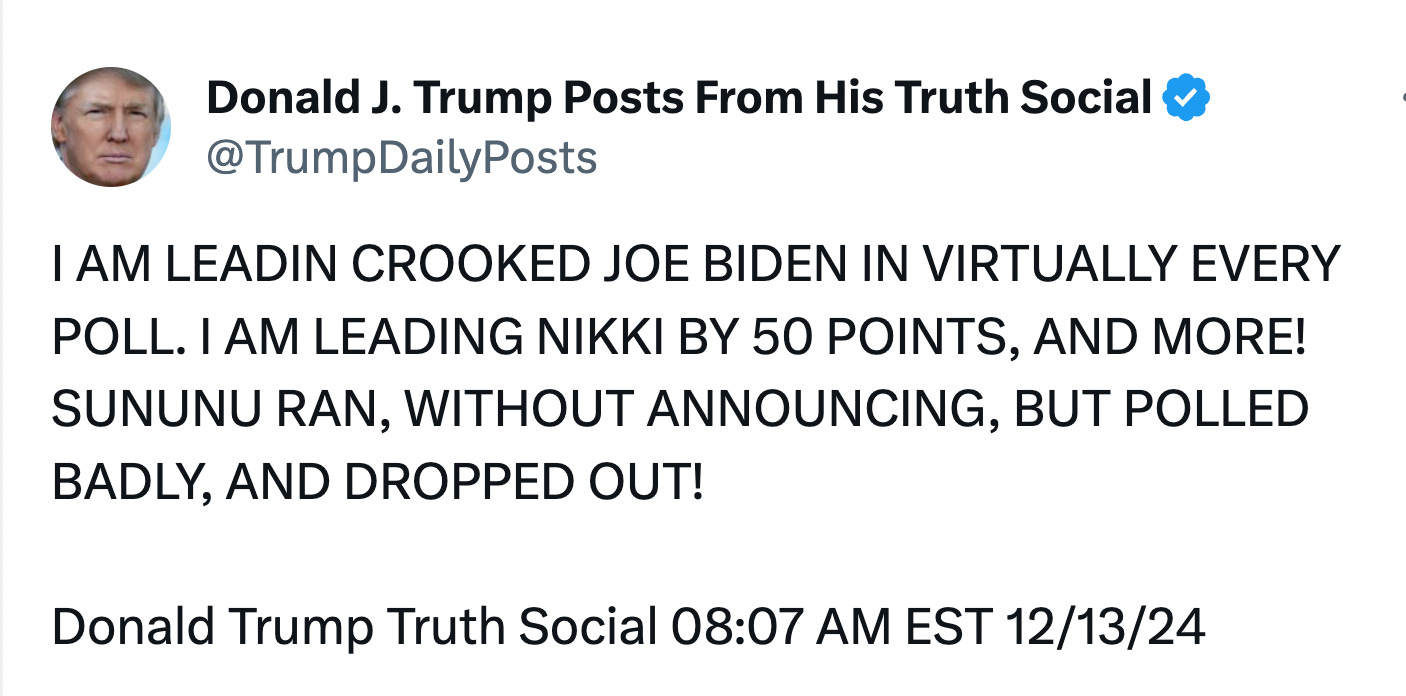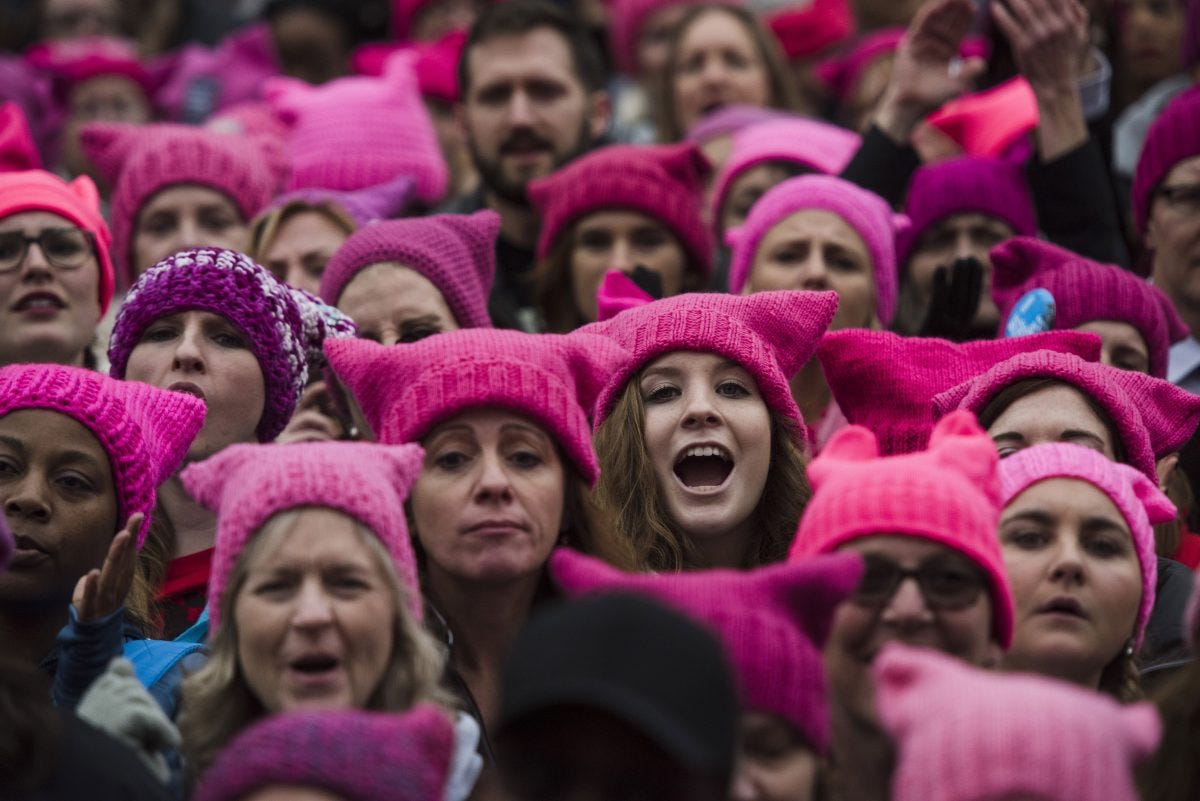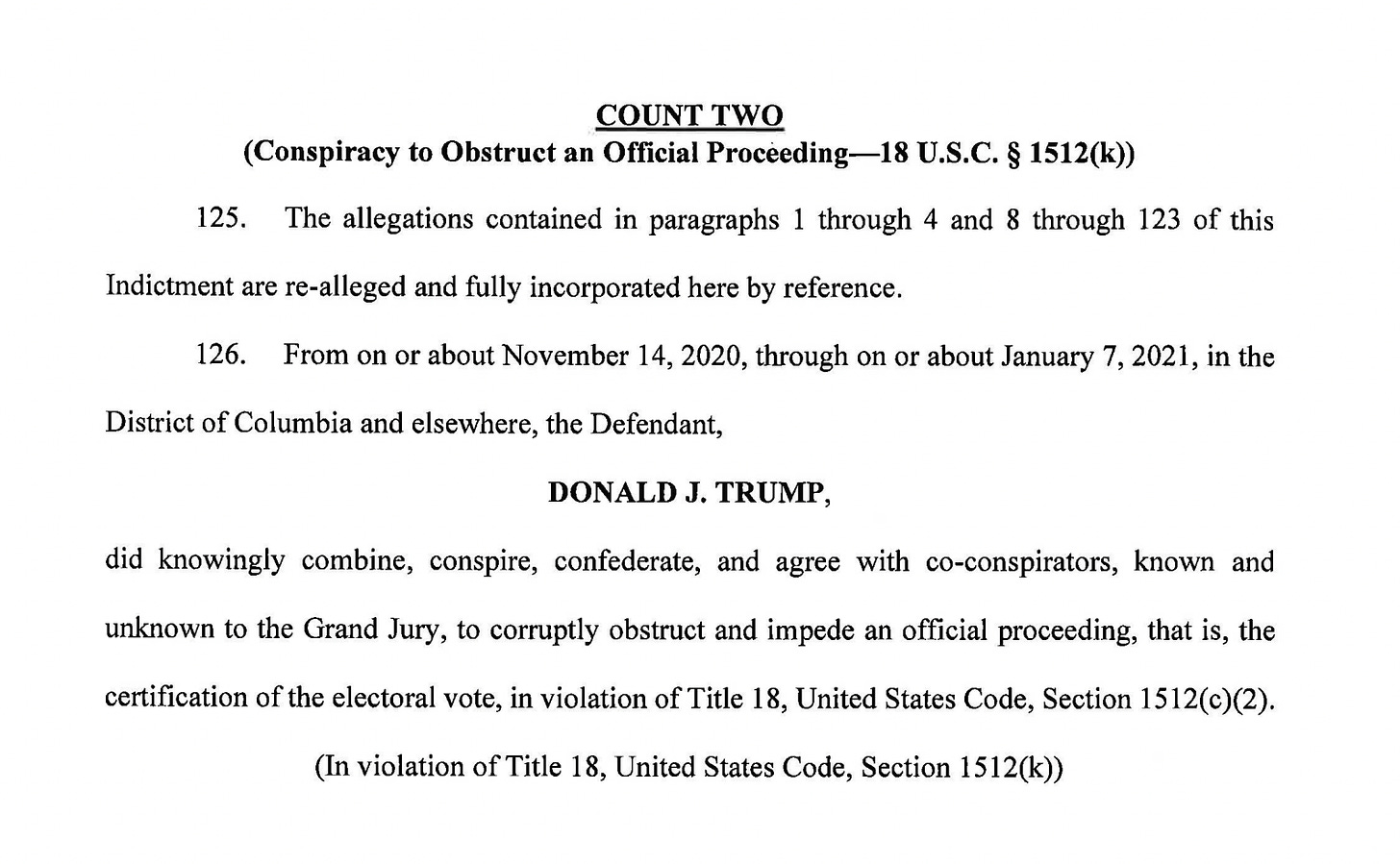Wednesday got off to a normal start, if by normal, you mean Trump acting crazy on social media. Every time he posts on Truth Social it’s another wake up call about what a disaster it will be if he gets a second term.
That’s not normal, even for a politician. But then neither is the fact that Trump is now auctioning off pieces of the suit he wore when he turned himself into the Fulton County, Georgia, Sheriff and had his mug shot taken.
Meanwhile, Republicans are being forced to confront the reality of record low unemployment as the Dow hit an all time high today. Perhaps that’s what set Trump off.
Republicans are responding to the good economic news with policy moves designed to help Americans even more. No, just kidding. Today, House Republicans devoted their time to debate and a vote on formally opening an impeachment inquiry into Joe Biden. As we’ve discussed here previously (A Revenge Impeachment), even some of their own number have acknowledged there was no evidence to support impeachment. But they voted for it today nonetheless. The final vote was 221-212, along party lines. You can watch Republican Senator Chuck Grassley admit today that there is no evidence to support impeachment.
Some of the Republicans said they were voting to open impeachment proceedings because the White House was “stonewalling” the inquiry. But the White House was quick to point out that House Republicans are in possession of 100,000-plus pages of records and have taken nearly 40 hours of testimony. The White House suggested that House Republicans couldn’t find any evidence, not because the President’s team was obstructing, but because none exists. Congressman Troy Nehls (R-Tx) was asked by a reporter what he hoped to get out of impeachment. He responded, "All I can say is Donald J. Trump 2024, baby."
In September, Donald Trump told Megyn Kelly in a radio interview that “I think had they not done it to me … perhaps you wouldn’t have it being done to them. And this is going to happen with indictments, too.”
As if that’s not enough for one day, there was also a deluge of legal news. Here are the highlights
SCOTUS agreed to hear an appeal of the Mifepristone (medication abortion) case this term.
We discussed this case at length when a group of anti-abortion plaintiffs brought this case in a single-judge division in Texas that virtually guaranteed it would be heard by Matthew Kacsmaryk, a judge who was appointed to the bench by Donald Trump with a strong anti-abortion agenda of his own. Mifepristone is one of two drugs used in combination for medication abortions—the majority of abortions in America—and is safer than Tylenol and Viagra.
The Supreme Court will now consider whether to uphold a lower court ruling that would reimpose outdated restrictions on access to medication abortion, which is time-tested, safe, and effective. That ruling would place decisions about complicated questions of science into the hands of federal judges instead of experts at the FDA, including whether the drug most commonly used for medication abortions will continue to be easily available, and especially available by mail, which has implications for women in areas without ready access to medical care.
If you want a refresher on what’s at stake with this one, read our earlier discussions here and here.
When the Supreme Court reversed Roe v. Wade in the Dobbs decision, it said it was leaving the question of whether and to what extent abortion should be legal up to each state. Judge Kacsmaryk entered a nationwide injunction that rescinded the FDA’s approval of Mifepristone, even in states where abortion is legal. His ruling has no exception for the health of the mother. Now, we find out whether the Supreme Court really meant to leave it up to the states, or whether this de facto nationwide ban on ready access to medicated abortion will become the law.
Nothing brings women out to the polls like telling them they can’t make decisions about their own bodies. Here we are again.
SCOTUS agreed to hear a case involving whether a statute used to charge January 6 rioters, and also Donald Trump, with obstructing an official proceeding applies to efforts to interfere with certification of the electoral college vote on January 6, 2021.
Count Two of the election interference indictment against Trump charges him with obstructing an official proceeding. The same charge has been used against a number of the January 6 rioters, and now the Supreme Court has agreed to hear an appeal over whether the law applies to a situation like this one. The D.C. Circuit reversed a district judge who ruled in the rioters’ favor.
Here’s the charge against Trump.
The law was passed following the Enron accounting scandal. There, executives of the company obstructed the investigation by shredding documents that could have incriminated them in an effort to prevent investigators from making the case. Because there is a series of statutes that prohibit obstruction, and they don’t always neatly fit the different types of obstructive conduct that have evolved over time, Congress passed §1512(c) to clarify the crime of obstruction of evidence or tampering with witnesses that were relevant to an investigation. The section makes it a crime if one corruptly:
(1) alters, destroys, mutilates, or conceals a record, document, or other object, or attempts to do so, with intent to impair the object’s integrity or availability for use in an official proceeding; or
(2) otherwise obstructs, influences, or impedes any official proceeding, or attempts to do so, shall be fined under this title or imprisoned not more than 20 years, or both. [emphasis added]
The twenty year penalty in the statute is the most serious one in the Trump indictment.
The defense argues that despite the plain language of the statute, it should be narrowly interpreted to fit the sort of situation the law was enacted for and that applying it to January 6 sweeps too broadly. And here’s the kicker, this is the kind of argument—that statutes criminalizing conduct should be narrowly construed—that has appealed to the Court over the past decades as they’ve limited statutes regarding bribery and other types of public corruption. So the fact that the votes were there for the Court to take the case is concerning. Fortunately, even if Jack Smith loses this charge, there are two other charges in the indictment, the conspiracy to defraud the government and the civil rights conspiracy, that would still be in play. The case will be argued after the first of the year and decided by the end of the term in June. Unlike the immunity appeal, it should not delay the trial before Judge Chutkan.
The DC Circuit agreed to expedite its consideration of Trump’s immunity ruling appeal.
Earlier this week, the big news was Jack Smith’s request to the Supreme Court that it leap frog over the Court of Appeals and hear Trump’s immunity appeal directly. Smith’s move to go straight to SCOTUS seemed to have been prompted, at least in part, by concerns that the Circuit didn’t seem particularly interested in kicking the appeal into gear quickly. They gave Trump until the end of the month to get the appeal docketed, which is just a matter of turning in some paperwork, and hadn’t set a briefing schedule.
But Smith simultaneously asked the Circuit to expedite briefing, and today they set a new pace, requiring Trump to file his opening brief on December 23, 2023. Jack Smith’s brief is due on December 30, 2023, and Trump’s reply must be filed by January 2, 2024. The court could hear argument and decide the case at any point after that. In his brief, filed earlier today opposing an expedited schedule, Trump had argued: “This proposed schedule would require attorneys and support staff to work round-the-clock through the holidays, inevitably disrupting family and travel plans. It is as if the Special Counsel “growled, with his Grinch fingers nervously drumming, ‘I must find some way to keep Christmas from coming. … But how?’” DR. SEUSS, HOW THE GRINCH STOLE CHRISTMAS (Random House 1957).”
The Circuit wished Trump a Merry Christmas and Happy New Year. His lawyers’ cheap attempt at humor was an embarrassment as public servants in the military and law enforcement work through the holidays to protect the country. It speaks to a lack of seriousness they bring to allegations regarding one of the most dangerous moments in our country’s history.
How does the Circuit’s action affect Jack Smith’s request to the Supreme Court? Trump’s response there is due on December 20. We’ll see if he appeals to anti-Grinch sentiment again, but he will undoubtedly take the path that would maximize the amount of time it takes to resolve the issue.
The action by the Court of Appeals may mean the Supreme Court feels less pressure to act. They could hold off, as they used to do with requests for certiorari in advance of judgment, expressing confidence the Court of Appeals will act promptly, sending them a decision and a complete record. But the case ultimately ends up before them and it makes the most sense for them to go ahead and hear it now. If they do let the Court of Appeals go ahead, it sets up the decision point we discussed originally where the Supreme Court could hear the case themselves after the Court of Appeals, which would take more time, or they could decline certiorari and let the Court of Appeals’ decision, whichever way it goes, stand.
In other words, the path forward here is still unclear, but will be set before long.
Still, it's very odd for a criminal defendant who, like Trump, files a motion asking a Court to dismiss an indictment against him to then argue against having the Court decide that motion as quickly as possible. Almost like they think the motion is a loser; like they’ve only filed the motion to try and delay the proceedings and they want to get the maximum bang for their buck. All Trump wants in interminable delay.
If the Supreme Court wants the chance to redeem itself after its Annus Horribilis, this would be the way to do it. Decide the legal issues, let the trial happen on schedule or close to it, let a jury weigh the evidence and render a verdict, let the country vote and move forward—hopefully on a track that permits us to continue as a constitutional republic. Trump’s lawyers got one thing right. They wrote, “the manifest public interest lies in the Court’s careful and deliberate consideration of these momentous issues with the utmost care and diligence.” And with all deliberate speed. The issues have already been fully briefed. As Judge Chutkan has already noted, the public, too, has an interest in a speedy trial.
Judge Chutkan has stayed further proceedings in her courtroom while the immunity issue is on appeal.
This decision came as no surprise. Jack Smith more or less conceded the matter in his request to the Supreme Court that they take the case. Judge Chutkan followed the law, further demonstrating that she’s the kind of judge who calls the balls and strikes without a preconceived commitment to letting one side win.
What continues to go unsaid in these proceedings is the likelihood that any of the cases, and the federal ones in particular, where a trial does not take place before the election are unlikely to ever get there if Donald Trump is elected. If there’s a more clear expression of the adage “justice delayed is justice denied,” I don’t know what it is. The stay should be an additional reason for the courts to act quickly to resolve the legal issues Trump has raised.
You can read Judge Chutkan’s order here.
Speaking of immunity…
The Second Circuit Court of Appeals rejected Trump’s effort to duck the E. Jean Carroll defamation lawsuits by asserting presidential immunity. With a second trial coming up in January—this one only to determine damages, as Trump’s liability has already been set—this was his last hope of avoiding another judgment against him and in Carroll’s favor.
Trump has a terrible track record when it comes to using the presidential immunity defense. Although this case, like the one decided in the D.C. Circuit last week, is a civil case, the parallels to the arguments Trump has raised in the criminal context are hard to miss. The consistent theme among courts that have considered the issue: Trump does not get to hide behind presidential immunity to shield decidedly unpresidential conduct.
That’s what so much of this comes down to. Trump wants to make use of the protections designed to let presidents serve the American people as a shield for behavior that only benefited him. Common sense tells us presidents cannot be above that law and that, in fact, they must be held to a higher standard, that they took an oath to serve. As discouraging as it is to watch the back and forth and the delays and wonder if Trump will ever be held accountable, the courts have the opportunity and the obligation to live up to the fundamental principles that make us a country of laws, not kings, and the next few weeks will likely tell the tale of whether they will meet them. As we watch, though, we also know that in the past, it has been the voters who have succeeded in holding Trump accountable, as we did after the events of January 6. It’s time for us to get ready to do it again.
We’re in this together,
Joyce








It’s starting to get interesting Joyce. The cry babies in the House continue to reaffirm their lackluster ploys to negate any form of intelligent discussions on urgent legislation that needs to be addressed. As Joe Scarborough recently said on Morning Joe, they simply don’t care 🤷 I was proud of Hunter Biden today refusing to appear before republicans in a closed door session. Thank you for keeping us on a need to know basis and for your articulation of what really matters to all of us. And tfg is the one who stole Christmas every day since he took office. It boggles the mind how we got here but the focus is now on where we are going and it’s not in Orange Town 🇺🇸🗽🗳️💙🎄✨
There is an upside if SCOTUS decides the president is above the law. That would mean Biden could arrest the GOP traitors in Congress and the rest of the conspirators and put them in a FEMA camp in Hell, er, I mean West Texas in the summer, and they couldn't do anything about it. (/snark)